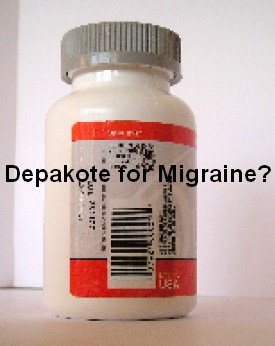|
Depakote Migraine Treatment - is it for me?In recent years, Depakote migraine treatment has become one of the most popular when it comes to migraine preventatives. Still, it's had its share of controversy, and is certainly better for some patients than others. Let's take a look at how this drug is used and whether or not it might be the answer for you. Depakote Migraine Treatment DefinedDepakote is actually a brand name used in countries such as the United States and the United Kingdom. Other brand names include Epival and Valance.The drug is actually called valproate semisodium or divalproex sodium, and is a compound of sodium valproate and valproic acid. It's related to drugs that contain valproic acid such as Depakene and Stavzor.
We aren't sure exactly how Depakote helps to prevent migraine. It has been suggested that it reactivates circuits in the brain that keep it from excessive "visual cortex excitability" (see Modulation of visual cortex excitability in migraine with aura: effects of valproate therapy.). But until we understand more about migraine, we may not be able to fully understand how divalproex sodium fights migraine symptoms. Using Depakote for MigraineFor must of us, Depakote and its generic versions are most useful for migraine prevention (the research hasn't supported its use as an abortive). This means that you may be taking an abortive drug as well when a migraine attack hits.Patients typically start on 250mg twice daily, and then are prescribed higher doses (up to 1000mg daily). Depakote migraine treatment has done well in clinical trials, and so it is generally considered to be among the first preventatives to try. It's used in both children and adults. It may help with a variety of migraine symptoms, not just headache, and also has been helpful for those with chronic migraine or chronic daily headache. Risks and ControversyOne of the best-known controversies over Depakote and other anti-seizure drugs (such as Topamax) erupted in late 2008. In the USA, the FDA decided to issue a warning that these medications could increase the risk of suicidal thoughts. The decision has been attacked, first because some researchers question the data, but also because the risk is small. Doctors didn't want patients to stop taking these medications because of such a small risk, because the risks generally outweighed the benefit. Read more about Anti-seizure meds and Suicide.As with any medication, it's important to discuss it with a doctor who knows your medical history. But here are a few things to keep in mind:
In one trial, 17% of patients discontinued Depakote migraine treatment due to side effects. The most common complaints were alopecia (hair loss) (6%), nausea and/or vomiting (5%), weight gain (2%), and tremor (2%). (Fore more details see Depakote Side Effects & Drug Interactions) Top Things To RememberIf you're considering Depakote migraine treatment, here are some of the most important things to consider:
References: Many sources were used for the above article. Some of the key ones (aside from the ones linked to above) include this article on Depakote migraine treatment from MAGNUM (accessed 2011); Pharmacological prophylaxis of chronic migraine: a review of double-blind placebo-controlled trials. (2010); Role of antiepileptic drugs as preventive agents for migraine. (2010); The Pill Book (13th edition, 2008); [Antiepileptic drugs for the prevention of pediatric migraine]. (2009) |
